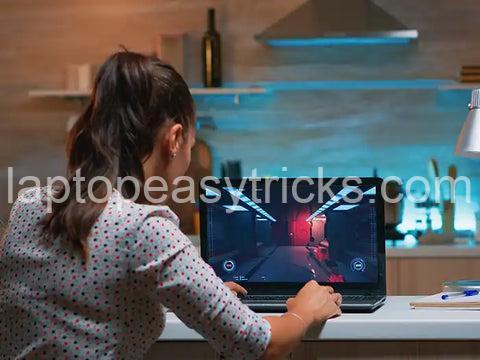Gaming Laptop Power Issues? Fix It Now!. In today’s article, laptopeasytricks.com will explore with you in the most detailed and complete way. See now!
iagnosing the Problem: Is it Hardware or Software?
Let’s be honest, a sudden shutdown mid-raid is never fun. Before we start throwing parts around, we need to figure out if the culprit is a mischievous software gremlin or a failing hardware component. This is where the detective work begins. Trust me, a methodical approach is your best weapon.
First, let’s talk symptoms. Is your gaming laptop:
- Suddenly shutting down? This could point towards overheating, a dying battery, or even a failing power supply unit (PSU).
- Draining battery ridiculously fast? This usually signals a software problem (like a runaway process), a faulty battery, or inefficient power management settings.
- Charging incredibly slowly or not at all? Check your power adapter, the charging port on your laptop, and the power outlet itself. A faulty cable or brick is a common culprit.
- Running excessively hot? This can lead to thermal throttling (performance reduction) and even shutdowns. Dust buildup is the most common cause, often neglected by gamers in the heat of battle.
- Making strange noises? Any clicking or buzzing from the power adapter or inside the laptop is a serious warning sign.
Now, let’s move on to the initial checks. Before we even think about opening up your prized gaming machine, try these:
Hardware Checks:
- Inspect your power cord and adapter: Look for any visible damage—frayed wires, bent pins, cracks in the casing. Even a tiny nick can cause intermittent power issues.
- Secure Connections: Make absolutely sure the power adapter is firmly plugged into both the laptop and the wall outlet. Try a different outlet to rule out a problem with your power supply.
- Check the charging port: Look carefully for any bent pins or debris blocking the connection. Gently clean the port using compressed air if necessary. Be extremely gentle!
Software Checks:
- Battery Health: Most modern laptops have a built-in utility to check battery health. Check it! If the battery is significantly degraded, replacement is almost certainly in order.
- Power Settings: Check your power settings in Windows. You might be running on “Power Saver” without realizing it, significantly impacting performance. Switch it to “High Performance” for gaming – your games will thank you.
That’s the preliminary investigation. Now we move to the more targeted detective work, starting with the software.
Troubleshooting Software Issues
Software problems are often easier and cheaper to fix than hardware issues. Let’s tackle these first:
-
Power Plans: Windows has various power plans (High Performance, Balanced, Power Saver). Select “High Performance” for gaming. However, remember that this will reduce battery life. To find these, go to Control Panel > Hardware and Sound > Power Options.
-
Background Processes: Resource-hungry programs running in the background can significantly impact your battery life and performance. Open your Task Manager (Ctrl+Shift+Esc), check the Processes tab, and close anything unnecessary.
-
Driver Updates: Outdated graphics drivers are a leading cause of power and performance issues. Visit the website of your graphics card manufacturer (NVIDIA or AMD) and download the latest drivers for your model. Do not skip this step!
-
Windows Updates: Sometimes a Windows update introduces or fixes power-related bugs. Make sure your system is up-to-date.

Troubleshooting Hardware Issues
If the software side of things is clean, it’s time to move on to the hardware. This is where things can get slightly trickier, so proceed with caution.
-
Power Adapter Diagnosis: If you have another laptop power adapter of similar wattage and voltage, try using it with your gaming laptop to check whether the issue is with your current adapter. You could also try the current adapter on a different laptop. This helps isolate if the problem lies with the adapter itself.
-
Battery Troubleshooting: If the battery is old or degraded, it can cause a range of power problems. Use your laptop’s built-in tools or third-party software to check the battery’s health. If it’s showing signs of significant wear and tear, replacing the battery is often the solution. Don’t forget to calibrate the new battery after installation for optimal performance.
-
Overheating: Gaming laptops generate a significant amount of heat. Ensure your laptop has proper ventilation. Avoid using it on soft surfaces (like beds or blankets) that can block air vents. Clean the vents regularly using compressed air. Consider a cooling pad for extra cooling power.
Advanced Troubleshooting
If you’re comfortable with a bit more technical troubleshooting:
-
BIOS Settings: If you’re really adventurous, you can check your laptop’s BIOS settings. Sometimes, power management settings within the BIOS can cause issues. However, be extremely cautious when modifying BIOS settings – an incorrect setting can potentially brick your laptop.
-
System Restore: If you recently installed new software or drivers, you might be able to use System Restore to revert to a previous point in time when your laptop was working correctly.
FAQs: Addressing Your Burning Questions
What should I do if my gaming laptop keeps shutting down unexpectedly?
This issue usually points to overheating, a failing battery, or a problem with the power supply. The first step is to check the laptop’s temperature using monitoring software. Next, examine the power adapter and battery. Lastly, consider checking if there are any resource-intensive programs running in the background.
My gaming laptop’s battery drains very quickly. What could be wrong?
Rapid battery drain can be caused by a variety of factors, including demanding programs, inefficient power management settings, a failing battery, or a malfunctioning power adapter. First, check your power settings and close unnecessary programs. Then, test the battery’s health. Finally, ensure the adapter and charging port are functioning correctly.
How can I prevent overheating in my gaming laptop?
Overheating is a common problem, especially for gaming laptops. To prevent it:
- Use a laptop cooling pad.
- Keep your laptop’s vents clean and clear of obstructions.
- Avoid using your laptop on soft surfaces.
- Monitor temperatures using monitoring software, and take breaks if the laptop gets too hot.
Why is my gaming laptop not charging?
If your gaming laptop isn’t charging, first check the power adapter, cable, and wall outlet for any problems. Ensure the charging port on your laptop is clean and free of debris. Try using a different power outlet. If the issue persists, the problem might be with the charging port itself, the motherboard, or the power adapter.
Conclusion
There you have it! By following these steps, you’ll be well on your way to conquering your gaming laptop’s power woes. Got any questions or success stories? Share them in the comments below! For more laptop tips and tricks, head over to laptopeasytricks.com. Happy gaming!
